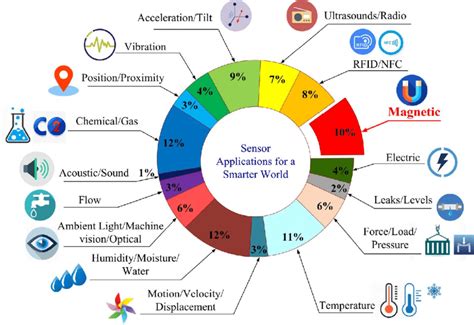The world of sensors is a vast and fascinating one, with applications that touch nearly every aspect of our lives. From the smartphones in our pockets to the cars on the road, sensors are the unsung heroes that make our technology tick. In this article, we'll delve into the world of sensor applications, exploring the many ways in which sensors are used to improve our daily lives.
The Importance of Sensors
Sensors are devices that detect and measure physical or environmental parameters, such as temperature, pressure, light, or motion. They play a crucial role in a wide range of applications, from consumer electronics to industrial automation, healthcare, and transportation. Without sensors, many of the technologies we rely on today would not be possible.
Types of Sensors
There are many different types of sensors, each designed to detect specific parameters. Some common types of sensors include:
- Temperature sensors, which measure temperature changes
- Pressure sensors, which measure pressure changes
- Light sensors, which measure light intensity
- Motion sensors, which detect movement
- Accelerometers, which measure acceleration and vibration
- Gyroscopes, which measure orientation and rotation
Applications of Sensors
Sensors have a wide range of applications across various industries. Here are some examples:
- Consumer Electronics: Sensors are used in smartphones, tablets, and laptops to detect orientation, motion, and light. They are also used in gaming consoles, fitness trackers, and smart home devices.
- Industrial Automation: Sensors are used to monitor and control industrial processes, such as temperature, pressure, and flow rate. They are also used to detect faults and anomalies in equipment.
- Healthcare: Sensors are used in medical devices, such as blood glucose meters, blood pressure monitors, and electrocardiograms (ECGs).
- Transportation: Sensors are used in vehicles to detect speed, acceleration, and orientation. They are also used in traffic management systems to monitor traffic flow and congestion.

Advantages of Sensors
Sensors offer many advantages, including:
- Improved Accuracy: Sensors can detect and measure physical parameters with high accuracy, making them essential for applications where precision is critical.
- Increased Efficiency: Sensors can automate processes, reducing the need for manual intervention and improving overall efficiency.
- Enhanced Safety: Sensors can detect faults and anomalies, allowing for early warning systems and improved safety.
- Cost Savings: Sensors can reduce costs by minimizing waste, improving resource allocation, and extending equipment lifespan.
Challenges and Limitations
While sensors have many advantages, they also face challenges and limitations, including:
- Sensor Noise: Sensors can be affected by noise, which can reduce their accuracy and reliability.
- Sensor Drift: Sensors can drift over time, requiring calibration and maintenance.
- Sensor Interference: Sensors can be affected by interference from other devices or environmental factors.
- Power Consumption: Sensors can consume power, which can be a concern for battery-powered devices.

Future of Sensors
The future of sensors is exciting, with many emerging trends and technologies on the horizon. Some of these trends include:
- IoT Sensors: Sensors are playing a critical role in the Internet of Things (IoT), enabling devices to communicate and interact with each other.
- Artificial Intelligence: Sensors are being used in conjunction with artificial intelligence (AI) to create smart systems that can learn and adapt.
- Nanotechnology: Sensors are being developed using nanotechnology, which enables smaller, more efficient devices.
- 5G Networks: Sensors are being designed to work with 5G networks, which will enable faster data transfer rates and lower latency.
Conclusion
In conclusion, sensors are a vital component of modern technology, with applications that touch nearly every aspect of our lives. From consumer electronics to industrial automation, healthcare, and transportation, sensors play a critical role in detecting and measuring physical parameters. While sensors face challenges and limitations, the future of sensors is exciting, with many emerging trends and technologies on the horizon.





FAQ
What are sensors?
+Sensors are devices that detect and measure physical or environmental parameters, such as temperature, pressure, light, or motion.
What are the advantages of sensors?
+Sensors offer many advantages, including improved accuracy, increased efficiency, enhanced safety, and cost savings.
What are the challenges and limitations of sensors?
+Sensors face challenges and limitations, including sensor noise, sensor drift, sensor interference, and power consumption.
